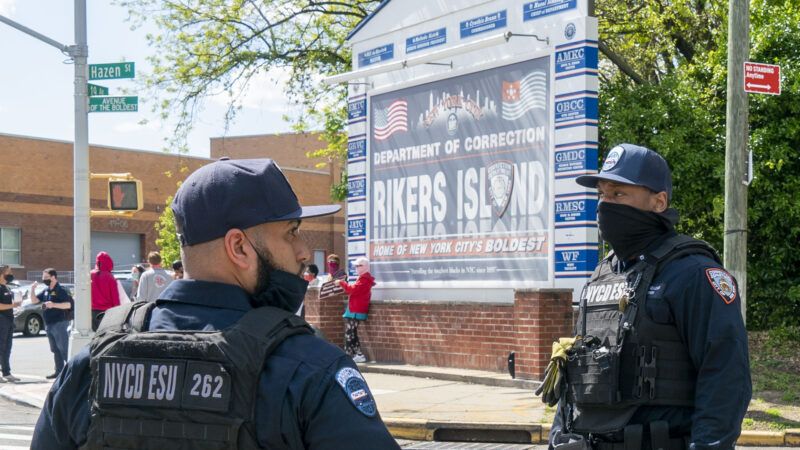Rikers Island Offers a Glimpse of America's Hellhole Prisons
Formal sentences cover for informal penalties including crowding, poor sanitation, beatings, and rape.

It's well known that the United States has an unusually high share of its population behind bars. What's less frequently acknowledged is that conditions in American jails and prisons are often barbaric, subjecting prisoners to punishment far beyond the severity of their formal sentences. The crisis at New York City's Rikers Island is forcing the matter into the public spotlight, but remedying the disaster there is only the beginning of necessary reform.
"There's garbage everywhere, rotting food with maggots, cockroaches, worms in the showers, human feces and piss," New York State Assemblymember Emily Gallagher tweeted on September 14 after a tour of the city jail. "Most of the toilets are broken so men are given plastic bags to relieve themselves in."
The rote comeback to complaints about conditions in detention facilities is that the inmates are criminals and therefore deserve brutal treatment. But Rikers Island is a jail complex—the vast majority of those held there are awaiting trial, and waiting, and waiting.
"[Otis Bantum Correctional Center] is where people are taken to be processed and wait for a hearing. People are supposed to be in and out within 24 hours," Gallagher added. "I met people who had been there for 3 months. No contact with family. Overcrowded. No air conditioning."
That center isn't even some legacy museum of archaic standards. "Opened in June 1985, it was completed in less than 15 months using modern design and construction methods," the New York City Department of Correction boasts. Nevertheless, conditions are so foul that the guards don't want to be there—many have been calling in sick and leaving the facilities understaffed.
Overall, "the pervasive level of disorder and chaos in the Facilities is alarming," a federal monitor noted earlier this year.
Not that any of this is a revelation. New York City has planned for years to close Rikers, but proposals to replace the facility with smaller jails scattered throughout the boroughs have dragged on—until recent violent outbreaks prompted new revelations that forced the issue. As conditions at Rikers grabbed headlines, Mayor Bill de Blasio belatedly acknowledged that those awaiting their days in court should finally get trials. Last week, his office announced the city would be "calendaring 500 court cases immediately out of the 5,000 people on Rikers Island in pre-trial, including over 1,500 people have been held for over one year."
Not to be outdone, New York Gov. Kathy Hochul announced the immediate release of 191 Rikers prisoners, and the transfer of some others to state-run facilities.
"New York State incarcerates more people for parole violations than anywhere in the country," she also noted as she signed a bill reforming the practice. "That is a point of shame for us, and it needs to be fixed."
That's well and good, assuming these moves result in long-term reforms, and those new procedures and replacement facilities improve on what went before. We'll see. There's also the issue, though, that Rikers Island may have grabbed the headlines, but similar conditions prevail elsewhere.
"Prisoner-on-prisoner homicide and sexual abuse is common," the U.S. Justice Department warned of Alabama's prisons in 2019. "Prisoners who are seriously injured or stabbed must find their way to security staff elsewhere in the facility or bang on the door of the dormitory to gain the attention of correctional officers. Prisoners have been tied up for days by other prisoners while unnoticed by security staff."
Last year, a follow-up report implicated Alabama's prison guards in "uses of excessive force—which include the use of batons, chemical spray, and physical altercations such as kicking—often result in serious injuries and, sometimes, death."
"Across Chicago and its surrounding counties, more than 1,000 inmates are packed in jails as they await transfer to state prisons due to an ongoing fight over COVID-19 safety protocols between state and local law enforcement agencies," the Chicago Sun-Times found in June. Across Illinois, this has resulted in "dangerous overcrowding and fights in those jails."
"Over the last decade or so, Arizona's prisons have become synonymous with mismanagement, lack of safety, unconstitutional health care, and abysmal conditions for people in custody," according to an Arizona State Law Review article published in January.
"Today, prisons and jails in America are in crisis," reports the Equal Justice Initiative, which works to improve conditions for prisoners. "Incarcerated people are beaten, stabbed, raped, and killed in facilities run by corrupt officials who abuse their power with impunity. People who need medical care, help managing their disabilities, mental health and addiction treatment, and suicide prevention are denied care, ignored, punished, and placed in solitary confinement."
Part of the problem is the sheer mass of inmates crowded into America's prisons and jails. Despite some progress towards reducing the numbers of people behind bars, the country still has a sky-high incarceration rate relative to most countries and certainly by comparison to other liberal democracies. (Nominally, it's the highest in the world, but you should take data released by the governments of such prisons-with-flags as China and Cuba with a sizeable grain of salt.)
Another serious concern is the very limited sympathy many people feel for those behind bars. Leaving aside the important issues of detention for those who have yet to be convicted of crime, and of what acts should even be punishable by the state, this creates a situation in which formal sentences cover for informal penalties including crowding, poor sanitation, beatings, and rape. The actual terms of incarceration are open-ended and determined by guards and other prisoners.
That's not a criminal justice system; it's neglect and torture.
The conditions at Rikers Island are sufficiently horrendous to have, again, captured the public's attention. That creates an opportunity for improvement of conditions at a jail complex that has long been known as a hellhole. If we're smart, we'll remember that the problem doesn't stop there, and neither should the reforms.


Show Comments (39)